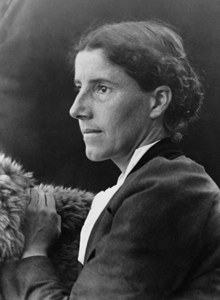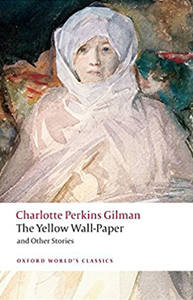
(‘Lagoa do Sol’ © Edward Zulawski, 2017)
OLD WATER, NEW WAVES:
CHARLOTTE PERKINS GILMAN’S FEMINIST FANTASY
by VICTORIA LESLIE
When I began to write short stories I felt hindered by the fact I had read so much. How could my voice possibly deign to sit alongside those who had come before? The idea was often incapacitating, stopping short my sentences, preventing me seeing my ideas clearly for fear they were derivative or unoriginal. In A Room of One’s Own, Virginia Woolf asserts that ‘a woman writing thinks back through her mothers’ – and I had a lot of literary mothers, from Woolf herself to Mary Shelley and Emily Bronte, to more modern exemplars like Angela Carter, Marina Warner and A. S. Byatt. These women writers had so powerfully influenced my idea of good storytelling that it felt almost impossible to begin, and yet I was encouraged by the fact that many of them were subverting and challenging established tropes and conventions, revisiting many of the stories that had come before and rewriting them, oftentimes from a fresh, feminist perspective.
The weight of the past is of primary concern to one of the most influential short story writers of the late nineteenth and early twentieth centuries. Charlotte Perkins Gilman is best known for her short story ‘The Yellow Wallpaper’, a feminist classic, drawing on her experience of post-partum depression following the birth of her daughter. Published in 1892, the story focuses on a woman prescribed the ‘rest cure’ and confined to an attic room by order of her physician husband, to alleviate her hysteria. She concedes to a variety of modern medicines from ‘phosphates’ and ‘tonics’ and is absolutely prohibited from ‘work’, though she believes it would do her good. With nothing else to occupy her mind, she becomes obsessed with the room’s yellow wallpaper, which is described as ‘committing suicide’ with the pattern ‘plunge[ing] off at outrageous angles’, foreshadowing the temptation the narrator feels to end her life. What becomes apparent to the narrator is a host of women behind the pattern of the wallpaper, creeping around, trapped within the design, symbolic of the fact many women of the period were trapped and imprisoned by societal expectations and their roles as wives and mothers.
The way women were supposed to behave and act was so ingrained – thanks to moral tracts, essays and even scientific studies by learned men of the period – that to go against the grain was seen as dangerously subversive. Coventry Patmore’s 1854 poem ‘The Angel of the House’ set the bar, espousing the idea that the ideal woman was passive, pious and self-sacrificing. Gilman’s optimism that times are changing, is expressed in her satirical response to Patmore’s idealised notion of femininity, ‘An Extinct Angel’, in which she proposes that ‘the Angel of the House’ has died out, replaced, we assume, by more enlightened and progressive women who are able to envision a future free of the cycles and patterns that have trapped their mothers.
 By the time Gilman’s short story ‘Old Water’ was published in 1911 change was afoot. Less well known than ‘The Yellow Wallpaper’, it likewise confronts the horror of male control and dominance but offers an alternative feminine experience for the next generation. The story focuses on the poet Mr Pendexter, and his advances toward a young girl, Ellen, who is remarkable for her athletic prowess and modern outlook. We are first introduced to her as she glides across a lake in a canoe, drawing the admiration of Mr Pendexter and her mother, Mrs Osgood, who is enamoured with the idea of her daughter marrying a poet. There is a sense that Mrs Osgood is revisiting her youth through her daughter and rectifying the choices she herself made, with Mr Pendexter representing, ‘all that her own girlhood had longed for’, though she had ended up the wife of a mill-owner. In fact, Mr Pendexter unwittingly reinforces this point, declaring, “What it must be to have such a daughter! To see your own youth – but a moment passed – repeated before your eyes!” Though the story, as we will see, is undoubtedly about the past, and the many ways history can repeat itself, Ellen is certainly cut from a very different cloth to her mother.
By the time Gilman’s short story ‘Old Water’ was published in 1911 change was afoot. Less well known than ‘The Yellow Wallpaper’, it likewise confronts the horror of male control and dominance but offers an alternative feminine experience for the next generation. The story focuses on the poet Mr Pendexter, and his advances toward a young girl, Ellen, who is remarkable for her athletic prowess and modern outlook. We are first introduced to her as she glides across a lake in a canoe, drawing the admiration of Mr Pendexter and her mother, Mrs Osgood, who is enamoured with the idea of her daughter marrying a poet. There is a sense that Mrs Osgood is revisiting her youth through her daughter and rectifying the choices she herself made, with Mr Pendexter representing, ‘all that her own girlhood had longed for’, though she had ended up the wife of a mill-owner. In fact, Mr Pendexter unwittingly reinforces this point, declaring, “What it must be to have such a daughter! To see your own youth – but a moment passed – repeated before your eyes!” Though the story, as we will see, is undoubtedly about the past, and the many ways history can repeat itself, Ellen is certainly cut from a very different cloth to her mother.
For one thing, she cannot abide poetry or anything that does not serve a practical purpose. She does not conform to typical notions of femininity and beauty, possessing a hearty appetite – despite her mother’s fears it might repel Mr Pendexter – being unfashionably tanned from so much time outdoors, and having a rather muscular bearing. Being in such a peak physical condition, resolutely training though there is “no race on”, means that she outperforms Mr Pendexter in nearly every leisure activity they attempt together, from canoeing and tennis to driving an automobile. Mr Pendexter, far from feeling emasculated, is further convinced of his passion for Ellen. He persists with compliments and flattery, comparing her to a myriad of goddesses and figures from classical mythology, such as Diana, Atlanta, Juno and Nausicaa. But Ellen has no interest in being typecast, voicing her complaints to her mother:
“He wants to go somewhere and arrange himself gracefully under a tree and read to me about Eloise, or Araminta or somebody; all slim and white and wavy and golden-haired; and how they killed themselves for love!”
The message seems to be that these archetypes are limiting and outdated; that aspiring to romantic constructions prevents women forging their own identities. Looking to the past for models of femininity, Ellen believes, is like digging up, ‘mummies – sort of warmed over and dressed up’.
Among the exhaustive list of deities and literary heroines that Mr Pendexter compares Ellen to, he refers to her as a ‘water goddess’, though we learn she has a fear of the water. Her mother tells Mr Pendexter proudly, “She does not really love the water” but “makes herself go out on it”, revealing an admiration for her daughter’s bravery. Ellen also admits to experiencing a recurring feeling, almost a sense of deju vu, beside the water: ‘It’s water – black, still, smooth water – way down below me. And I can’t get away from it. I want to – and then someone grabs me – ugh!’
 Her intuition proves to be prophetic, as having rebuffed Mr Pendexter’s advances at the summit of a cliff, he seizes hold of her and throws them both over the edge and into the lake at the bottom. The idea of the past haunting the present is made explicit in Mr Pendexter’s final speech in which he insists that they have “lived through this before” in a previous life; his romantic sensibilities compelling him to believe that dying for love is far more elevated than facing rejection and life alone.
Her intuition proves to be prophetic, as having rebuffed Mr Pendexter’s advances at the summit of a cliff, he seizes hold of her and throws them both over the edge and into the lake at the bottom. The idea of the past haunting the present is made explicit in Mr Pendexter’s final speech in which he insists that they have “lived through this before” in a previous life; his romantic sensibilities compelling him to believe that dying for love is far more elevated than facing rejection and life alone.
But Ellen is not doomed to become another watery victim. When we think of the nineteenth century cult of the drowned woman, and of the abundance of these tragic figures in art and literature, borne up by the water like John Everett Millais’ Ophelia, or drifting toward death like Alfred Lord Tennyson’s Lady of Shalott, Gilman’s story offers a new kind of heroine for the new century. Ellen has indeed been in training, facing the dark waters of the past and learning how to navigate them. She re-emerges from the water to tell the tale, with the coda, “pretty lucky I could swim” serving as a moral to women everywhere to learn to be self-reliant and autonomous.
The ‘old water’ of the title is not simply about the past impacting the present, of how the same patterns can be perpetuated again and again. It is about breaking free of the cycles we often don’t know are there, and recognising new ways of thinking. Mr Pendexter and Ellen’s mother belong to the old regime and, despite the jovial tone of the story and the pity for Mr Pendexter’s misplaced passion and subsequent fate, he is an aggressor who wants to force a young woman to conform to his romantic ideals. However, it is Ellen who swims free and Mr Pendexter who drowns under the weight of his obsolete ideas.
~
 Victoria Leslie’s stories have appeared in a range of publications, including, Black Static, Interzone and Shadows and Tall Trees and have been reprinted in a range of ‘Year’s Best’ anthologies. Her short story collection, Skein and Bone was a finalist for both the British Fantasy and World Fantasy Awards. Leslie’s fiction has also been shortlisted for the Shirley Jackson Award and has won the 2013 International Lightship First Chapter Prize. Her debut novel, Bodies of Water, which explores nineteenth-century gender roles and ideologies was published by Salt Publishing in 2016.
Victoria Leslie’s stories have appeared in a range of publications, including, Black Static, Interzone and Shadows and Tall Trees and have been reprinted in a range of ‘Year’s Best’ anthologies. Her short story collection, Skein and Bone was a finalist for both the British Fantasy and World Fantasy Awards. Leslie’s fiction has also been shortlisted for the Shirley Jackson Award and has won the 2013 International Lightship First Chapter Prize. Her debut novel, Bodies of Water, which explores nineteenth-century gender roles and ideologies was published by Salt Publishing in 2016.


One thought on “Old Water, New Waves”
Comments are closed.